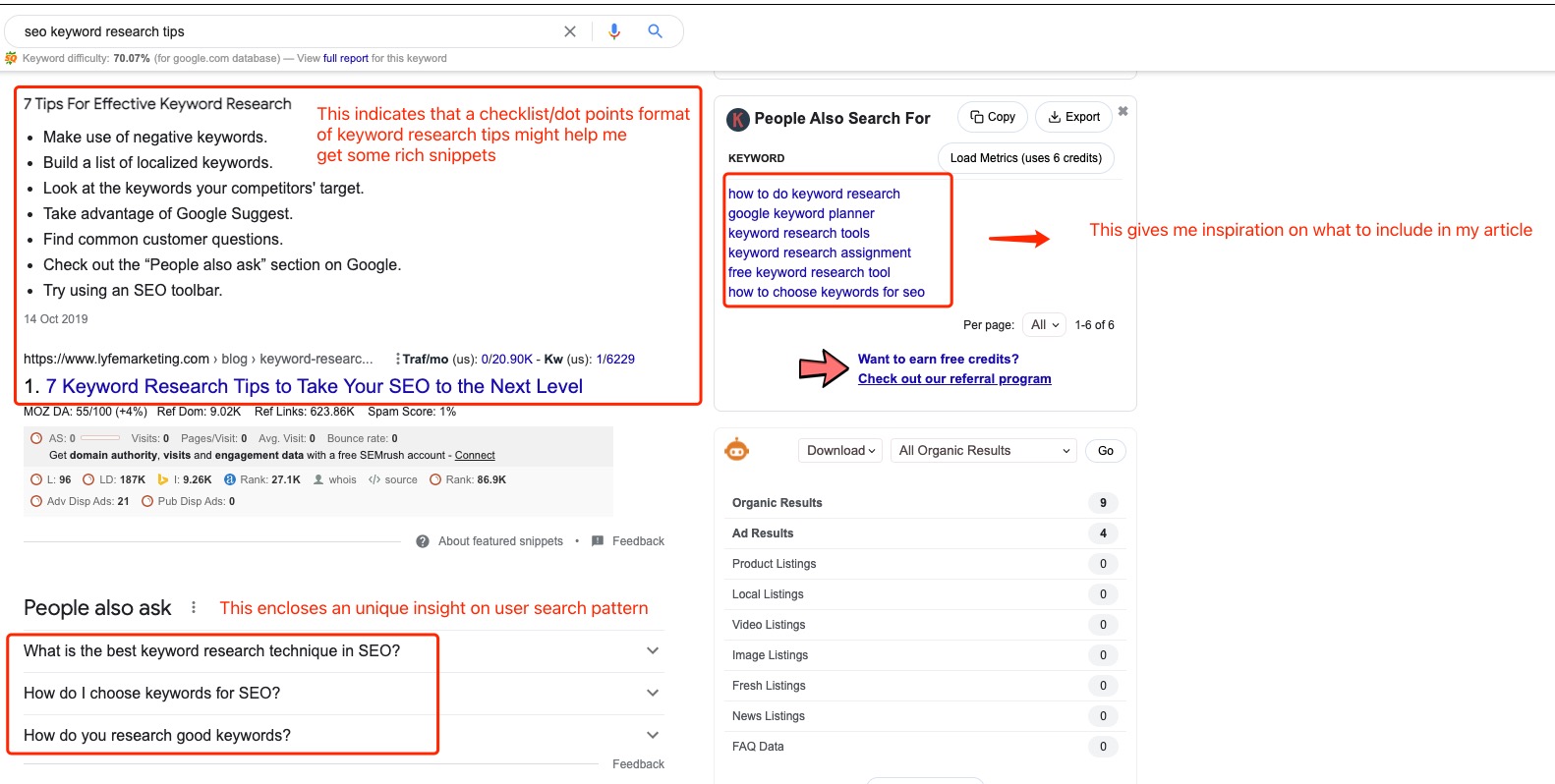Table of Contents (Click to show/hide)









An SEO Keyword Research Step By Step Guide - TL;DL SEO Checklist
Keyword research is a valuable tool that’s often under utilised by many website owners. It’s often seen as a complicated process that is far too time-consuming and complicated. But keyword research is really pretty easy to get right and put simply is discovering the words, topics, phrases, and questions that your target audience use in search engines such as Google, Bing, or social media platforms like YouTube.
Let’s demystify the process for finding the best keywords and explore some advanced tactics for SEO keyword research.
Find 3-7 seed keywords (or head keywords)
Of course, you’ll have some keywords in mind that you’ll aim to rank for. Start off by noting down these keywords and then research the following:
- How competitive they are – Keyword Difficulty
- How much traffic they generate – Search Volume
- How you might optimise for those keywords – Search Intent
These seed keywords will include your product or service and are a great place to start your keyword research. Also, don’t forget to use semantic words associated with your seed keywords.
For example, your seed keyword is “computer”. Semantic keywords could be the following;
- Problem with computer
- PC virus
- Buy computer
- Buy new laptop
The next step is to find relevant keywords that your target audience may also use to find your product or service. Use a keyword research tool to identify similar keywords and measure their potential for monthly search volume. You’ll also likely discover other keywords, topics, and common questions that are popular search queries used by your target audience.
What are the tools to get some keyword inspirations?
- Answerthepublic.com – get the FAQs about what, how, where etc
- Keywordseverywhere.com – get insights about long-tail keywords
- Google Ads & Microsoft Keyword Planner – check how machines read your page content
- Soovle.com – get autocompletes with phrases from different search engines
- Tagcrowd.com – Check your competitors’ content keyword frequency
- Keyworddit.com - built by Reddit, it’s an excellent way to find search pattern

Some honourable mentions
- keywordsheeter.com
- Alsoasked.com
- Questiondb.io
The most relevant keywords will often have a far higher search volume, and it’s crucial to target these keywords. On the other hand, you’ll also want to target search terms, topics, and questions with a lower search volume as there will be far less competition. Try to find the balance between high and low-volume keywords to give your website the best chance of ranking in search results. In conclusion, check the following criteria to ensure your solid selection:
Ö Short length in word count & meaning can be ambiguous. E.g. car
Ö Keywords have relatively high search volume
Ö Keywords have a relatively low keyword difficulty score
Ö Keywords have semantic meanings to each other
Decide what funnel of customers you are targeting
Choose from the Awareness, Consideration and Intent funnel. It’s important to know what angle your target audience is likely to approach, and this is often referred to as the ‘customer funnel’. Are they a knowledge seeker, a customer, or someone surfing the net for entertainment? It’s crucial to analyse your audience's search intent.
Drilling down on your customer funnel will yield better results, will make your content more relevant and have a better chance of higher engagement and better ranking on search engines. Remember, the funnel you choose is for the page, not your overall audience.

If the page is designed for Awareness funnel, this means the page content is targeting for audiences who don’t know your brand & services and have no intention to make a purchase. The content & keywords should be industry-related, problem-solving and educational to the pain points. Those who find your content helpful and interesting may journey on to the middle of the funnel. Suitable content type: Whitepaper, infographic, free e-book, checklist, educational videos, industry expert interviews.
If your page is designed for Consideration funnel, the page content is targeting the prospects who are looking for a good, long-lasting solution but struggling with different options. Your page content from the Awareness pages has captured prospects attention and now it’s the perfect opportunity to show why your solutions, in particular, are the best fit. Suitable content type: webinars, case studies, trial & samples, ready-to-use templates.
If your page is designed for the Intent funnel, you should try everything to convince your audiences that your solutions are the best options. By this stage, your audience has become more loyal to you, and you should use this to educate less and promote more. Suitable content type: Landing pages for ads, comparison, reviews & testimonials, coupons and discount codes, trial & samples.
Based on your target funnel, pick the search intent to combine with the seed keywords
When doing keyword research, it’s important to understand the search intent of your target audience. Here’s a breakdown of the most common groups of search intent:
- Informational intent: Knowledge searchers or researchers looking for an answer to a specific question or general information. E.g.; “how to clean sneakers”
- Navigational intent: Searchers intend to find a specific site or page. E.g. “Vans sneakers in Sydney”
- Commercial intent: Searchers looking to investigate products, services, or brands. These commonly have an intent to complete an action or purchase sometime in the future. E.g. “best sneakers for walking”, “best cleaner for sneakers”
- Transactional intent: searchers intending to complete an action or purchase (aka buyer intent keywords). E.g. “buy sneakers online”
Make sure you optimise your content to your specific target funnel. For example, if you’re trying to entice customers to buy your product, your keyword research should focus on keywords, questions, phrases, and topics used by potential buyers.
Ö Awareness Funnel – informational
Ö Consideration Funnel – Navigational & Commercial
Ö Intent Funnel – Transactional
Find your current strength from these tools: Google Search Console, SEMrush, Ahref
While there are plenty of tools out there to help with SEO, such as Google Search Console, SEMrush, Ahref, Neil Patel, etc., you don’t need to master them all. It’s really only important to master one, so pick one and get familiar with all of the features so you can get the most out of your chosen tool.
If you’re familiar with a few specific features across different tools, that’s fine too. Just don’t spend hours learning the same technique from a different tool, as that time could be better spent elsewhere in your journey for better SEO and keyword research.
I like combining SEMrush & Ahref because Ahref has a better interface for finding related searches & relevant searches. Moreover, it provides topical information for each keyword. However, SEMrush has the most extensive database and can identify search intent. For more information, please have a look at my SEO tool comparison here.
Related Article:
SEMrush vs Ahref vs Moz - (Almost) Everything You Need to Know About These Top SEO Tools
Using UGC-focus content site to find unknown search patterns:
(Refer to point #2 for the list of tools) User-Generated Content (UGC) is also known as User-Created Content (UCC), which are terms used to describe the content on sites such as Reddit, Quora, AskthePublic, Tiktok, Twitter, and other popular social media platforms.
These platforms offer users the ability to associate tags or hashtags that can be helpful to identify with keyword research. All of this data is available for analysis and is a treasure-trove for those looking to target UGC-focused content.
UGC-focused content usually has one clear goal, and that’s engagement, so make sure you hone your content to generate views and engage with your audience. This will offer the best chance of getting customers more profound into your sales or influence funnels.
A really good tip: search your target keywords on Google

Google is your best friend when it comes to SEO and finding the best keywords. Simply search using your seed keywords and look at what Google suggests in the search queries.
Look at the top three search results and analyse the platform and type of content used in those websites. To rank with the best, you’ll need to apply a similar content structure. For example, use bullet points, lists, bold texts, or tables to clearly provide engaging and informative content. Also, search your target keywords on Google. And find out what format of content the #1-#3 result has used. Copy it. It can be using bullet points, an order list, or a special type of content.
After you gather all the info, you need to sort it out
Finally, organise your keyword research into clear categories that relate to specific search intent. Headings such as ‘Awareness, Consideration, Intent Funnels’ are a great start and will get the ball rolling for optimised keywords that can be used throughout your content.
As you can see, there are a few advanced tips that will lead you on the right path for keyword research and help you create far more engaging content for your target audience. Use clear and well-organised keyword research related to specific search intent. Always do research that’s the most relevant to your desired customer funnel.
References
- https://moz.com/beginners-guide-to-seo/keyword-research
- https://analytics.moz.com/pro/keyword-explorer
- https://backlinko.com/keyword-research
- https://www.deanlong.io/blog/best-practices-for-youtube-video-seo
- https://en.wikipedia.org/wiki/User-generated_content









